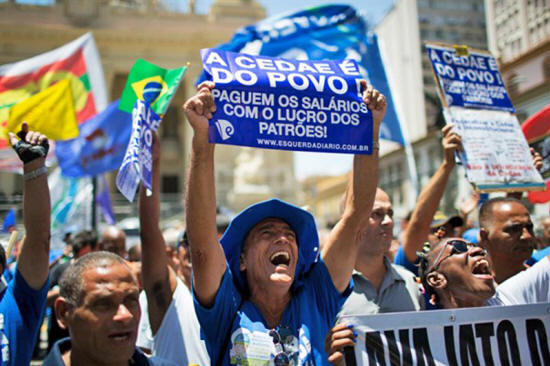|
from WorldPoliticsReview Website Recovered through Googles'sCache Services
"CEDAE belongs to the people," during a protest against a move to privatize the state water and sewage company, CEDAE, Rio de Janeiro, Brazil, Feb. 20, 2017 (AP photo by Leo Correa).
A resident in Rio de Janeiro's largest favela, Rocinha, Jose Martins is worried.
Earlier this year, Rio's city council voted to sell the state-owned water and sanitation company, CEDAE, a move that Martins believes puts access to water and sanitation at risk for almost 50,000 residents in Rocinha alone.
Martins is not the only one worried about the wider implications of the sale in Rio.
In the weeks leading up
to the vote, protests broke out on a weekly basis in the city
center, stopping only when military police resorted to tear gas and
rubber bullets.
The state, which has a
$2.9 billion deficit to plug by the end of the year, declared a
financial emergency last year before the Olympics. But Rio is not
the only state in Brazil experiencing severe economic stress.
Brazil's other states aren't in the clear:
Partially privatizing state assets is emerging as the Brazilian government's strategy to manage these crippling state debts.
The federal government
has specified that any state declaring a financial emergency must
privatize a state-run company within the energy, sanitation or
financial sectors in order to receive further financial assistance.
Although not full
privatization, the move - the first by a Brazilian state toward
privatization - has done little to appease public angst.
There is precedent for this.
Alexandre Mendes, a law professor at Rio's Pontifical Catholic University, found that the private electricity company Light, which had been state-owned until 1996, began issuing higher bills to residents in certain favelas in recent years.
The cost proved to be
incompatible with their incomes, leaving several unable to pay for
electricity in 2014.
They also point to
figures from the United Nations that estimate that by 2050, more
than two-thirds of the world's population will not have access to
clean drinking water.
International investors
believe water will follow a similar pattern to oil during the 20th
century. Under existing agreements, Rio's environmental agency
controls and gives most of the state's river water to CEDAE, so any
buyer would have significant control over a valuable natural
resource.
Rocinha's raw sewage waterfalls are a symbol of state neglect for residents, but also a symbol of the state's financial impotence for observers.
But private management will not guarantee results without proper public governance.
Another controversy around the water sale is CEDAE's potential buyer, Aguas do Brasil, which is the largest private sanitation company in the country.
It is a union of four companies, three of which are under investigation in Brazil's long-running scandal of high-level political corruption.
According to Monica de Bolle, Rio's deal may not solve the state's sanitation issues or help plug its financial holes.
The initiative to privatize state-owned companies is not just Rio de Janeiro's problem.
Similar talks are
underway to privatize Rio Grande do Sul's water and sanitation
company, Banrisul. Minas Gerais has refused to follow suit, but is
looking to privatize the parking in a busy city district, where some
7,500 cars circulate daily.
Brazil's government
continued its privatization quest in March, selling off four
airports across the country and reportedly hoping to sell a further
six this year.
As numerous states teeter
on the brink of bankruptcy, there could be more deals like Rio's
water sale, creating other problems and raising costs for
Brazilians.
|


